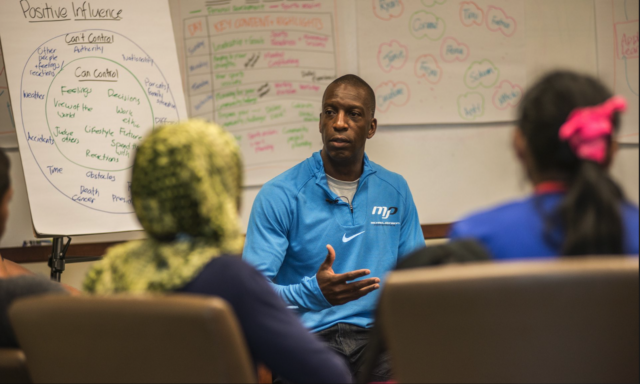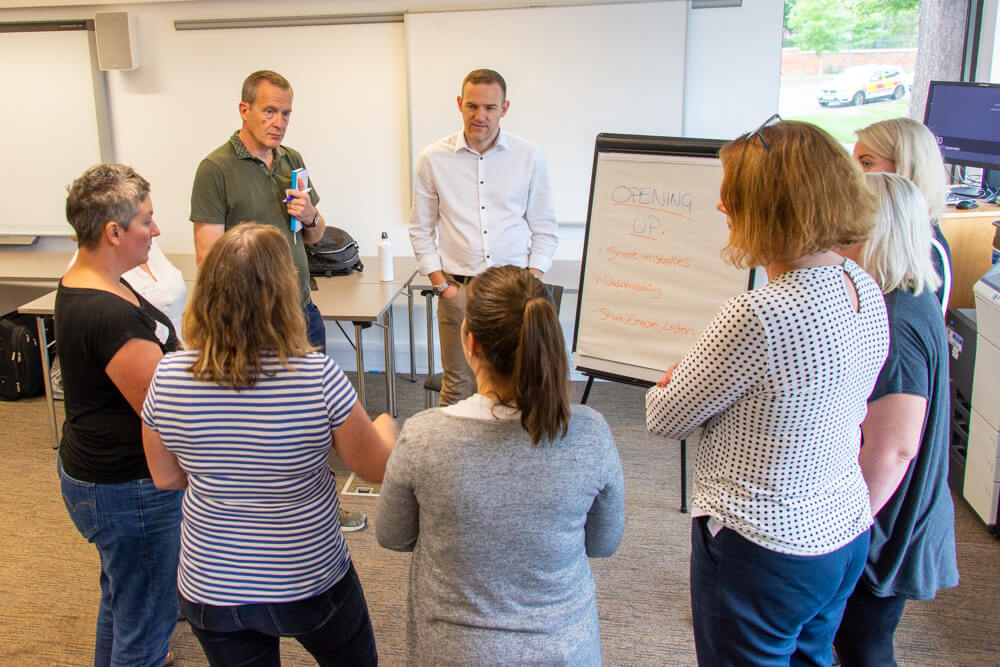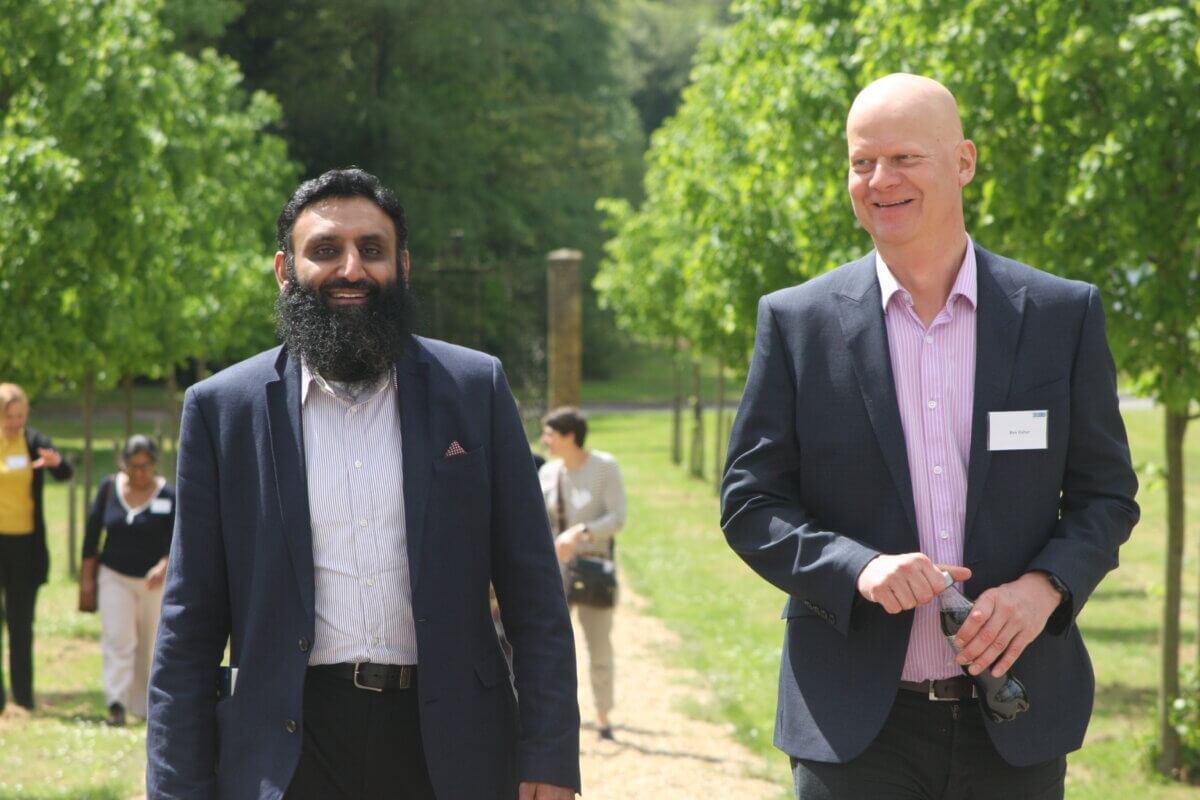
Compassionate Leadership is not soft
Over the last 8 years, we’ve worked alongside leaders in the health sector, both here in the UK and overseas as part of the International Masters for Health Leadership, run by McGill University.
In the UK, where CoCreate is based, the challenge for healthcare leaders is how they respond to surging demand (for example, projections indicate that by 2040, approximately 9.1 million people in England will be living with major illnesses such as cancer, diabetes, and dementia – a 37% rise from 2019[1]) whilst at the same time cutting costs.
These cuts will come with a heavy human cost. 12,500 staff currently employed by the 42 ICBs are likely to lose their jobs. Approximately 7,500 from across NHSE and Department of Health and Social Care will also go, and it’s reported that hospitals in England could shed tens of thousands of posts[2]. Even without this, the UK health and social care workforce is bruised and battered, facing unprecedented levels of stress and burnout and many are leaving the profession[3].
People are often drawn to working in health and social care by an inbuilt desire to serve and look after others. By nature they are compassionate yet they’re operating within a system that is driven for efficiency, not compassion. One study found that 56% of healthcare professionals don’t think they have enough time for compassion because they need to focus on other tasks including administration, reducing costs and improving productivity[4].
In this article we explore how we can develop Compassionate Leadership in a system that is not designed to promote it. We start with considering what Compassionate Leadership, why it’s so important and then move on to how we nurture it.
What is compassionate leadership?
Compassionate leadership started to gain attention as a formal concept in the late 2010s, in large part down to the excellent research led by Professor Michael West[1]. Leadership in the NHS was trying to shift from purely hierarchical and directive approaches to more inclusive and compassionate methods as a way of creating person-centred care.
The literature outside of health and care focuses on how leaders create an environment where people feel valued, respected and supported, not just for what they contribute as employees but for who they are. This is a key part of it. We want our leaders to understand their colleagues as human beings, to support them through good and bad times, to create a level of psychological safety where colleagues feel able to voice concerns and share ideas, and to invest in their professional development.

Crucially Compassionate Leadership also means not shirking the difficult conversations. It isn’t about being soft or avoiding accountability – it’s about leading with heart, fostering trust, and driving success through connection, care and candid debate. It means that we have our colleagues’ best interests at heart and – as a result – this may require us to give honest feedback which can be challenging to hear. Clarity is kindness, something that Brené Brown highlights in her book, Dare to Lead.
What we love about Michael West’s work is the balance he strikes between the empathy, compassion and courage we demonstrate towards others AND self-compassion. In his 2013 book, ‘The Compassionate Mind’, Paul Gilbert defined compassion as ‘a sensitivity to suffering in self and others with a commitment to try to alleviate and prevent it’.
Why is compassionate leadership important?
This self-compassion piece is crucial. When are energy levels (cognitive, emotional, physical and spiritual) are high, we’re likely to think clearer, be more objective, more creative, make better decisions, and be more compassionate to others.
Compassionate Leadership therefore starts with us: how we grow and nurture ourselves to be able to cope with the complexity of the challenges we face.
Leading with compassion for others has 6 key benefits:
- Enhanced employee engagement – employees who feel cared for are more likely to be motivated and feel a sense of personal agency in their work.
- Improved collaboration – compassion fosters trust, strengthens the connections between people and builds the capacity for cooperation.
- Reduced discrimination – when leaders seek to understand and value colleagues as people who matter like they do, we become more connected to one another and move beyond our biases and assumptions.
- Higher retention rates – a supportive, inclusive work environment where people feel valued can improve job satisfaction and reduce turnover, stress and burnout.
- Increased creativity and innovation – people are more likely to take risks and propose ideas when they feel safe, supported and valued.
- More resilience – teams led with compassion are better equipped to navigate challenges and recover from setbacks.
This is about establishing rituals – ways of working – within teams and across organisations that help employees value and support one another. Here is just a few examples of what we’ve seen work well.
- Regular check-ins
Setting aside dedicated time as a team to check in on a personal and professional level is vital. This could be at the start of a meeting or in a 1:1. When we ask questions such as ‘how are you?’, it’s with genuine curiosity and a willingness to hear the other person, learn more about them as human beings and – importantly – take action based on what they share. We’re not listening to fix or rescue (as a parent might listen to a child) but to learn what role we can play in creating the conditions for this person to do their best work (adult to adult).

- Developmental feedback
It’s an art to give and receive high quality, developmental feedback. To nurture this, a client set up a weekly ‘hot seat feedback’ session where team members took it in turns to share a couple of things they really valued in each other, and one thing they’d like to see more of. With practice, the quality of feedback offered became more constructive. If we really care about someone, we’ll give them the feedback – in a clear, kind and respectful way – as soon as is practical so that they can act upon it. The annual appraisal is ill suited to the pace of change!
- Celebrate successes
Make time to celebrate successes and show genuine appreciation for the contributions of others. One of our clients set up a regular Friday ‘good week, bad week’ ritual, where teams reflected on the highlights and lowlights of their week. This increased knowledge sharing and mutual support across the team, as well giving them the opportunity to celebrate the wins.
- Set up a Leadership Exchange
Set up a Leadership Exchange programme across your company whereby people spend time observing one another in their role, learning about their priorities, their needs, their challenges. Getting an insight into someone else’s world – ‘walking in your shoes’, as it’s sometimes called – is a brilliant way of building empathy and compassion across an organisation. Armed with this insight, it becomes a lot easier for individuals and teams to adapt what they’re doing to be helpful to others.
Developing self-compassion
Leaders set the tone for Compassionate Leadership – our compassion to others is made a whole lot more genuine when we show compassion to ourselves.
In a recent coaching session with a Chief Executive, he talked about not wanting to tell colleagues about the very real family pressures he was facing. Telling colleagues was – in his view – a sign of weakness. Yet if we are unwilling to show our own humanity to our colleagues, then any attempts to attend to the concerns or needs of others is going to appear inauthentic.
Here are 4 rituals that I know work well for me.
- Mindful pauses
As someone with young children, who has always lived life in a perennial hurry, stillness is my biggest challenge! My morning ritual is to take two minutes to slow down, breathe, place my hand on my heart and say, ‘may I be kind to myself today.’ It sets a tone of self-compassion for the day ahead. On a similar theme, I find a mindful pause really helpful at any point during the day if I notice my cortisol levels surging. I acknowledge what’s happening, that this is ok, take a few deep breaths and again repeat the line ‘may I be kind to myself today.’
- Time in nature
Movement and fresh air is good for the soul, and – unsurprisingly, given the above – comes easier to me. Finding time within the day to be outside and take in my surroundings really helps me decompress. 10 years ago, I use to complain about the daily commute into London and the time it took to travel between meetings. Now I’m hopping from one virtual call to another with zero time in between to reset. I know that for me, without this decompression time, I end up replaying meetings in my head at 3am.

- Good diary management
I’ve become much more disciplined in this area over the years: dedicated time during the day to respond to emails and messages (as opposed to all of the time); factoring in a 5-minute break between meetings to reset; limiting the amount of meetings in any day. These small changes have helped bring greater focus to my work.
- Gratitude jars (or diaries, vision boards, etc)
Lots of people have versions of this ritual which they do on their own and/or with loved ones. For me, I have a carousel of photos from the last 10 years rolling on my desktop screen. If I’m working from home, when my children leave for or get back from school, they always come and have a look at the photos. It’s a lovely mindful pause, a moment to be grateful for what we have.
In summary
If our organisations are primarily driven for efficiency, leaders have to counterbalance this with ways of working in which compassion can flourish. We call these rituals as these come with intention and are typically underpinned by a clear meaning, significance or sense of purpose that goes beyond the action itself. James Clear’s ‘Atomic Habits’ is a brilliant book on this topic, although perhaps he should have called it Atomic Rituals!
How compassionate are you? Complete this 10-minute self-assessment, developed by Kristin Neff, a pioneering researcher and teacher of self-compassion, to find out. And for a conversation about how you can develop Compassionate Leadership within your organisation, please get in touch.
[1] https://swirlingleafpress.com/compassionate-leadership/
[1] https://www.health.org.uk/press-office/press-releases/25-million-more-people-in-england-projected-to-be-living-with-major
[2] https://www.theguardian.com/society/2025/apr/08/hospitals-england-shed-jobs-cost-cutting-nhs
[3] https://www.bain.com/about/media-center/press-releases/2024/tackling-job-dissatisfaction-among-uk-doctors-and-nurses-critical-to-improving-nhs-performance-and-productivity-bain–company-study-shows/
[4] https://pmc.ncbi.nlm.nih.gov/articles/PMC3445669/









